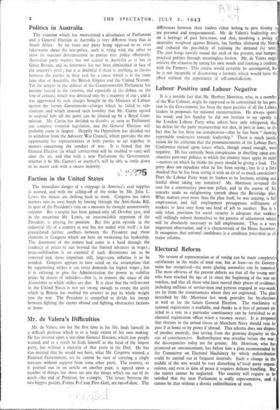Mr. de Valera's Difficulties
Mr. de Valera, not for the first time in his life, finds himself in a difficult position which is to a large extent of his own making. He has insisted upon a war-time General Election, which few people wanted, and as a result he finds himself at the head of the largest party, but without a majority of that party in the Dail. He has also insisted that he would not have, what Mr. Cosgrave wanted, a National Government, yet he cannot be sure of carrying a single measure without support from some other party. The country, as is pointed out in an article on another page, is agreed upon a number of things, but those are just the things which are out of its reach—the end of Partition, for example. The issues 'between the two biggest parr ea, Fad 'anti Fine Gaul; are out-of-date. The differences between their leaders either belong to past history or are personal and temperamental. Mr. de Valera's leadership rests on a heritage of past bitterness, and that, involving a policy of neutrality weighted against Britain, has further alienated the Nort and reduced the possibility of realising the demand for unity. The past hangs heavily round the neck of the present, and hampers practical politics through meaningless faction. Mr. de Valera might retrieve the situation by eating his own words and forming a coalition with the Farmers. This course would certainly be uncongenial, but he is not incapable of discovering a formula which would have the effect without the appearance of self-contradiction.


























 Previous page
Previous page